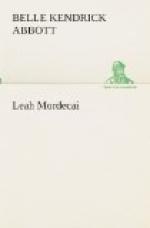“No, my love, I came softly that I might not disturb you; came to thank you for the sweet music that in this early morning sounds-so heavenly, I will say. Play me something else, as sweet and tender as the sonata you have just finished, and then come here and sit beside me; I have something to tell you.”
“With all my heart, father,” Leah replied, rising and turning through a mass of music. “Shall it be a song, father?”
“By all means, my dear.”
And drawing forth the well-worn pages of Beethoven’s “Adelaide,” the young girl reseated herself, and sang.
The tender words of her father, as well as the ominous ones, “I have something to tell you,” startled Leah, and caused the chords of love and fear to vibrate wildly within her bosom. Yet she concealed her deeper feelings, and sang-beautifully, bravely, sweetly-the tender, ravishing love-ditty which she knew was her father’s favorite. The melody died away, the chords relaxed and hushed their sweetness, and Leah turned toward her father, awaiting the words of commendation that he always awarded to her performances. But he was silent. Seated upon a divan near by, Mr. Mordecai presented a striking appearance, which Leah at once observed. He was attired in his crimson morning-gown, adorned with golden bordering, and wore a becoming scarlet cap carelessly adjusted upon his head; a golden tassel hung from the cap beside the thoughtful face, and the half-snowy beard which spread like a silken fringe upon his bosom. His head was half-averted, and the sharp black eyes seemed to rest immovably upon some central figure on the luxurious tapestry. He was so absorbed that he heeded not the cessation of the music, nor was he aroused from his abstraction till Leah seated herself beside him and said:
“Now, father, I am ready to hear you.”
“Forgive me, daughter, if I seem unmindful of your charming song; but thoughts for your welfare filled my reverie.”
“What thoughts, father?” Leah asked fearfully.
“Well, listen to me. I have planned for you, my daughter, a most delightful and profitable journey. Assured that you possess musical talent of the highest order, I desire that talent to be most highly cultivated. The culture you need cannot be obtained in this country; so I have written to my cousin, Baron von Rosenberg, to have you become a member of his distinguished family for a time. Under his care and direction, your studies can be pursued to the greatest advantage. What do you think of the arrangement?”
As Mr. Mordecai was unfolding what he supposed would be a pleasant surprise to his daughter, he marked the serious, even pained expression of her face, and wondered at it.
Leah was silent. Then, with an air of surprise and disappointment, her father repeated the inquiry. “What do you think of my plan? You cannot possibly dislike it, my daughter!”
“Saxony is a great way off from you, dear father-I believe the baron lives in Saxony. I do not think I could be happy so far away from you, the only living human being who loves me truly in this cold world.” The last words were spoken bitterly.




